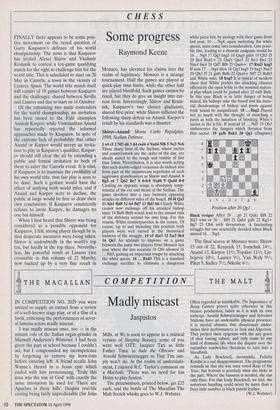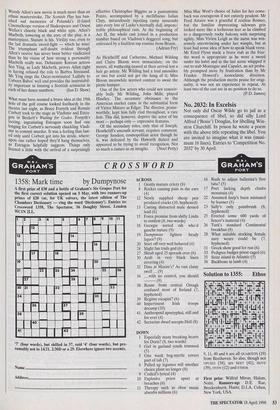COMPETITION
THE MALT
Madly miscast
Jaspistos
IN COMPETITION NO. 2029 you were invited to supply an extract from a review of a well-known stage play, or of a film of a book, criticising the performances of sever- al famous actors madly miscast.
I was madly miscast once, too — in the minute role of the Italian organ-grinder in Maxwell Anderson's Winterset. I had been given the part at school because I couldn't act, but I compounded my incompetence by forgetting to remove my horn-rims before entering left. A friend recalls John Wayne's Herod in a Jesus epic which ended with him pronouncing, 'Truly this man was the son of God' with exactly the same intonation he used for 'There are Apaches in those hills'. Despite real-life casting being fairly unpredictable (Sir John Mills, at 90, is soon to appear in a musical version of Sleeping Beauty), some of you went well OTT: Jacques Tati as little Father Time in Jude the Obscure and Arnold Schwarzenegger as Tiny Tim sim- ply won't do. In the realm of understate- ment, I enjoyed R.C. Taylor's comment on a Macbeth: 'There was no need for Ian Holm to play Seaton.'
The prizewinners, printed below, get £25 each, and the bottle of The Macallan The Malt Scotch whisky goes to W.J. Webster. Often regarded as unsinkable, The Importance of Being Earnest proves quite otherwise in this bizarre production, laden as it is with its own icebergs. Arnold Schwarzenegger and Sylvester Stallone have an undeniable physical presence: it is mental absence that disastrously under- mines their performances as Jack and Algernon. They project their epigrams with the airy grace of men tossing cabers, and only come to any kind of dramatic life when the dispute over the cucumber sandwiches threatens to turn into a bloodbath.
As Lady Bracknell, meanwhile, Felicity Kendal is a sad disappointment. The programme reminds us that she was once voted Rear of the Year, but bottom is precisely what she lacks in the part. Where the bassoon is needed, she can only flute. For this Lady Bracknell, we feel, the notorious handbag could never be more than a boxy little number in black patent leather.
(W.J. Webster) Woody Allen's new movie is much more than an ethnic masterstroke. The Scottish Play has ban- ished sad memories of Polanski's ill-fated CinemaScope version of Shakespeare and Orson Welles's chaotic black and white epic. Allen's Macbeth, towering at the core of the play, is a masterpiece. Stature is his. Virility too, even to the last dramatic sword-fight — which he wins! The triumphant self-doubt evident through Allen's oeuvre has never been better vindicated than by his vision of how strong a personality Macbeth really was. Debutante Korean actress Soo Ying, as Lady Macbeth, proves Allen right in having refused the role to Barbra Streisand. Ms Ying sings the Oscar-nominated 'Lullaby to Unborn Babes' well and provides the inscrutabil- ity important in limning a Scottish aristocrat in each of her dance numbers. (Ian D. Shaw) What must have seemed a brave idea at the 19th hole of the golf course looked foolhardy in the theatre last night, as Bruce Forsyth and Ronnie Corbett took to the stage as Vladimir and Estra- gon in Beckett's Waiting for Godot. Forsyth's leering, ingratiating Estragon soon had one longing for Corbett's nervously chuckling Vladi- mir to commit murder. It was a feeling that last- ed only until Corbett got into his stride, where- upon one rather hoped they'd hang themselves, as Estragon helpfully suggests. Things only livened a little with the arrival of a surprisingly effective Christopher Biggins as a pantomimic Pozzo, accompanied by a mellifluous Julian Clary, miraculously injecting camp innuendo into every line of Lucky's normally dull, impene- trable philosophical • rant. At the beginning of Act II, the whole cast joined in a production number based on Vladimir's doggerel song, but enlivened by a faultless tap routine from Brucie.
(Adrian Fry) As Heathcliff and Catherine, Michael Wilding and Claire Bloom were immaculate; on the moors, all wuthering ceased at their arrival lest a hair go astray. Mr Wilding had a trial smoulder or two but could not get the hang of it; Miss Bloom meanwhile seemed content to await the picnic hamper. One of the few actors who could not conceiv- ably bully Mr Wilding, John Mills, played Hindley. The necessary obeisance to the American market came in the substantial form of Victor Mature as Edgar. The director, praise- worthily, kept him fully clad throughout, a rare feat. This did, however, deprive the actor of his most — perhaps only — expressive features. Of the secondary roles, only that of Joseph, Heathcliff s uncouth servant, requires comment. George Sanders, cosmopolitan actor though he is, was defeated by the Haworth dialect and appeared to be trying to avoid recognition. Not so much a cameo as an intaglio. (Noel Petty) Miss Mae West's choice of Juliet for her come- back was courageous if not entirely prudent. Mr Fred Astaire was a graceful if restless Romeo, but the familiar deprecating sideways grin looked more like a lecherous leer as he climbed to a dangerously rocky balcony with surprising agility. Miss Vivien Leigh as the nurse was win- somely unconvincing under her wimple, but at least had some idea of how to speak blank verse. Mr Errol Flynn made a brave stab as the friar: the word is appropriate as he wore a sword under his habit and in the last scene whipped it out to stab Montague and Capulet, an act proba- bly prompted more by frustration than by Mr Frankie Howerd's iconoclastic direction. Although the production merits praise for origi- nality, it was not an experience to repeat. At least two of the cast are in no position to do so.
(P, D. James)



























































 Previous page
Previous page